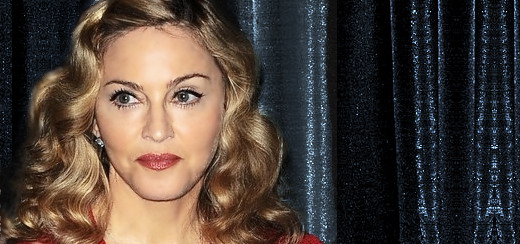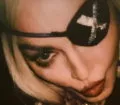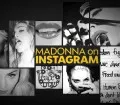
From the Hollywood Reporter
This afternoon, I had the great and — if not unique — rare pleasure of spending about 15 minutes one-on-one with Madonna, who is indisputably one of the world’s most famous and influential people and one of its most successful and ambitious artists.
Madonna has conquered the world of music — singing, dancing, music videos, concerts, you name it — and would be well within her rights, at the age of 53, to sit back and rest on her considerable laurels. But, ever the risk-taker and provocateur, she decided to make a film. Not just any film, but a film about King Edward VIII, whom much of history has dismissed as a Nazi sympathizer, and Wallis Simpson, the American divorcée for whom he abdicated the throne, and whom much of history has derided as a trollop and floozy. They were both depicted, as you may recall, in The King’s Speech, last year’s best picture Oscar-winner, and not in a particularly flattering way.
Madonna, however, saw something different — a woman that she could relate to, and a love story that she felt she had to share. So, with the complete understanding that her critics (who are outnumbered only by her loyal fans) would be sharpening their knives for her, she set to work.
After an arduous 52-day shoot, the finished film W.E (as in Wallis and Edward) — which she says might be her proudest accomplishment — had its world premiere at the Venice Film Festival last week, screened for the press at the Toronto International Film Festival this morning, and will have its North American premiere in Toronto tonight.
It’s not a perfect film (pacing is a bit of an issue, and the Julie portion of its Julie & Julia structure is, as in that film itself, weaker than the Julia portion) and it’s not going to be an easy sell (“It’s not Hangover 2,” Madonna joked during our chat), but the truth is that it’s well acted (particularly by Andrea Riseborough as Simpson); visually beautiful (with terrific costumes, makeup, and cinematography) and aurally pleasing (its score sticks in your mind); and considerably better than I had been led to believe by its early reviews.
Anyway, when Madonna welcomed me to her hotel suite for our interview, I half-jokingly confessed to her — as you can hear for yourself below — that I was uncertain of how to address her: I didn’t feel right calling her by her first name, but I haven’t ever heard anyone call her by her last name (Ciccone, for the record), so I was at a loss. “Everyone calls me ‘M,'” she said, and we were off.
Her childhood heroes/idols
“I was a dancer, so Martha Graham was a big hero to me, because she basically took classical dance and turned it on its head — took the foundation garments off of everybody, and toe shoes. She was considered a provocateur and a rebel because women were dancing in their bare feet. What a scandal! Not wearing bras? What a scandal! She single-handedly, kind of, created the modern dance movement.”
How her other work has served her as a filmmaker
“Being a dancer has given me a background with a lot of discipline… All the shows that I’ve done — I’ve put together — I’ve worked with a director, but I’ve collaborated very closely with the costume designer, with the lighting designer, with the set designer, with the choreographer, and been very involved in every aspect and all the minutiae of putting on a show, so I think that’s also helped prepare me for directing a film. And then, of course, being an actress, I’ve watched, and observed, and learned, you know, whether it’s understanding about cameras, and lenses, or, you know, how directors talk to actors — all of that stuff. I’ve had a good education.”
How she came to know the story of Wallis Simpson and King Edward VIII
“I first heard of the story when I was in high school — I was just reading about history. I was like, ‘Oh, that’s interesting: an American woman from Baltimore… the King of England, you know, leaves the throne for her?’ But I didn’t focus on it. And then, when I moved to England — when I first got married and moved there — I found myself feeling like a foreigner; like, I needed to educate myself and get to know about English history. So, through lots of book reading, and trying to understand the monarchy, and English culture, and the class system — which is non-existent in America — I, you know, came across the story, and I was really intrigued by it.”
On strange connections that convinced her to make the movie
“It was a combination of not just the story of the Duke and Duchess, but also understanding the auction — the Sotheby’s auction — and how, curiously, the house [in which Wallis and Edward lived after he abdicated the throne] in the Bois de Boulogne [Paris] had been bought by Mohamed Al-Fayed, who is, sort of, a cultural figure in England, and his son [Dodi Fayed] was killed in a car accident with Princess Diana, who was, you know, the Princess of Wales, you know? So there’s all these strange, connecting stories, and it just kept weaving its web around me, and finally I decided that I wanted to tell that story.”
On the personal bond that she feels with Wallis Simpson
“I don’t think it was so conscious when I first was attracted to the story, but after I shot the film and as I watching it. For instance, in the letter scene — when Abbie’s character goes to the Bois de Boulogne, and she’s reading the letters, I thought, you know, ‘I could have written that letter!’ You know? Like, when she’s talking about the press, and people being unfair, and things like that, and not being able to defend herself, and feeling helpless in that way. You know, I’ve had those moments in my life.”
Whether she ever considered starring in the film herself
“Absolutely not. I do not resemble Wallis Simpson in any way, shape, or form.”
On the 52-day shoot for W.E
“I needed about 70… It was a gnarly shoot, I have to say. We worked really long days; we went into overtime every day. My crew in England was extremely generous with me. I slept very little. You know, it was a big challenge and a very ambitious shoot because, you know, we moved around a lot — it was not just shot in England; we went to France (I shot in Paris and the south of France); New York (Manhattan, Brooklyn).”
On working with Abbie Cornish and Andrea Riseborough
“Very pleasant. I got along really well with all my actors. And I like to create a family environment — I’ve always done that with my shows and my tours. I like to spend time with the actors, giving them as much information as possible to help them with their characters; rehearsing; you know? Yeah, it’s really important, spending time with them, and feeling a connection to them, and making them feel safe with me so that they can be free to ask questions, or, you know, express themselves in any way, shape, or form. You know, both of the women had to play a lot of very emotional scenes, and they needed to feel safe.”
On taking on new challenges, even at this point in her career
“The idea isn’t that once I do something well I have to move on and do something else. I mean, I’d like to make more films. I really enjoy the process. As exhausting and daunting as it was — physically, emotionally, in every way you could imagine — I did — I do — love the art of film, and I would love to have the ability and the chance to make another one. The same goes with music and everything I do. I don’t ever look at what I have done and say, ‘Okay, I’ve done enough’ or ‘I’ve done it all and I have nothing else to say.’ You know, as a human being, I continue to change and grow, so I always have new things to say.”
Whether she thinks her movie would be judged differently if people didn’t know she was its director
“Absolutely. They would just focus on the film and not the filmmaker, which is what they do with everyone else’s movies.”
On the onset of fame/celebrity and how she dealt with it
“I think it’s shocking to everyone. I don’t think anyone can be prepared for it… In the grand scheme of things, it’s [a burden and a plus] in equal measures, I would say. It’s as great as it is not great.”
On the loss of anonymity and the ability to live a typical life if/when she wishes
“I mean, I walk around my neighborhood in Manhattan and people don’t bother me; go to local restaurants and have dinner. I was on holiday in the south of France, and managed to sneak out with my friends, and just drive around the Riviera, and get a little place on the beach with a baseball cap on — nobody bothered me — and ate an ice cream, and read a book, and felt like everybody else.”
On what she — like Edward VIII — would be willing to give up everything for
“I would do anything for my children. For sure. Except have a marmite sandwich — my daughter’s insistent that I eat one, but I won’t! Vile…”
On whether she might ever stop working/retire
“I don’t know. I don’t have a crystal ball. I think I’ll always be productive, in one way or another, but I don’t know in which way. I mean, I might not be still working in the entertainment business, but I’ll always want to be productive in some way.”
On her proudest artistic accomplishment
“Well, I’m extremely proud of this film — I put a lot into it and I’m proud of it — and I’m proud of my performance in the film Evita (1996). Just to name two… I can’t say which record I like better or which song I think is better… that’s not fair.”
Listen to Madonna’s Podcast From the Toronto Film Festival…
Madonna Podcast From the Toronto Film Festival by TheHollywoodReporter
Madame X is available in Box Set, CD, Vinyl and Cassette!
Get your copy HERE!





